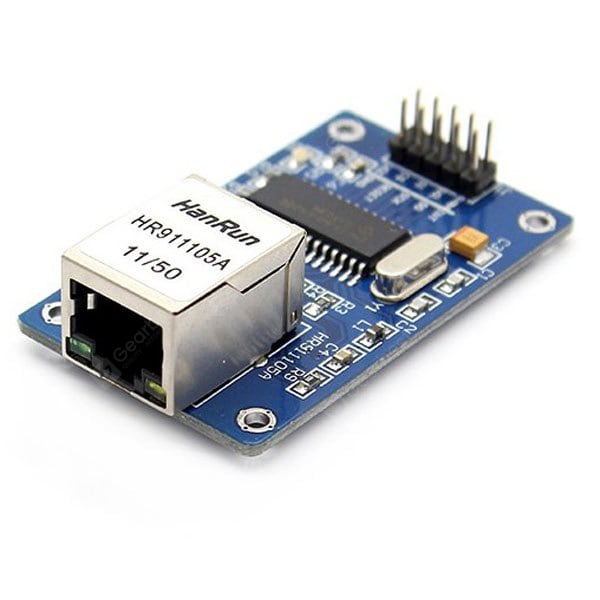Mbed library for ENC28J60 Ethernet modules. Full support for TCP/IP and UDP Server, Client and HTTP server (webserver). DHCP and DNS is included.
Dependents: mBuino_ENC28_MQTT Nucleo_Web_ENC28J60 Nucleo_Web_ENC28J60_ADC Serial_over_Ethernet ... more
Library for ENC28J60 Ethernet modules.

Ported to mbed from Norbert Truchsess's UIPEthernet library for Arduino. Thank you Norbert!
- Full support for persistent (streaming) TCP/IP and UDP connections Client and Server each, ARP, ICMP, DHCP and DNS.
- Works with both Mbed OS 2 and Mbed OS 5.
Usage:
- Import the library into your project.
- Add
#include "UipEthernet.h"tomain.cpp - Create one instance of the UipEthernet class initialized with the MAC address you'd like to use and SPI pins of the connected Mbed board.
Example programs:
Import programWebSwitch_ENC28J60
HTTP Server serving a simple webpage which enables to remotely turn a digital output on/off. Compile, download, run and type 'IP_address/secret/' (don't forget the last '/') into your web browser and hit ENTER.
Import programHTTPServer_Echo_ENC28J60
A simple HTTP server echoing received requests. Ethernet connection is over an ENC28J60 board. Usage: Type the server's IP address into you web browser and hit <ENTER>.
Import programTcpServer_ENC28J60
Simple TCP/IP Server using the UIPEthernet library for ENC28J60 Ethernet boards.
Import programTcpClient_ENC28J60
Simple TCP/IP Client using the UIPEthernet library for ENC28J60 Ethernet boards.
Import programUdpServer_ENC28J60
Simple UDP Server using the UIPEthernet library for ENC28J60 Ethernet boards.
Import programUdpClient_ENC28J60
Simple UDP Client using the UIPEthernet library for ENC28J60 Ethernet boards.
Import programMQTT_Hello_ENC28J60
MQTT Client example program. Ethernet connection is via an ENC28J60 module.
TcpClient.h
- Committer:
- hudakz
- Date:
- 2020-07-23
- Revision:
- 18:8d5738a6646e
- Parent:
- 13:95c00132cd98
File content as of revision 18:8d5738a6646e:
/*
UIPClient.h - Arduino implementation of a UIP wrapper class.
Copyright (c) 2013 Norbert Truchsess <norbert.truchsess@t-online.de>
All rights reserved.
This program is free software: you can redistribute it and/or modify
it under the terms of the GNU General Public License as published by
the Free Software Foundation, either version 3 of the License, or
(at your option) any later version.
This program is distributed in the hope that it will be useful,
but WITHOUT ANY WARRANTY; without even the implied warranty of
MERCHANTABILITY or FITNESS FOR A PARTICULAR PURPOSE. See the
GNU General Public License for more details.
You should have received a copy of the GNU General Public License
along with this program. If not, see <http://www.gnu.org/licenses/>.
*/
#ifndef TCPCLIENT_h
#define TCPCLIENT_h
#include "mbed.h"
#include "IpAddress.h"
#include "utility/MemPool.h"
extern "C"
{
#include "utility/uip.h"
}
#define UIP_SOCKET_DATALEN UIP_TCP_MSS
//#define UIP_SOCKET_NUMPACKETS UIP_RECEIVE_WINDOW/UIP_TCP_MSS+1
#ifndef UIP_SOCKET_NUMPACKETS
#define UIP_SOCKET_NUMPACKETS 5
#endif
#define UIP_CLIENT_CONNECTED 0x10
#define UIP_CLIENT_CLOSE 0x20
#define UIP_CLIENT_REMOTECLOSED 0x40
#define UIP_CLIENT_RESTART 0x80
#define UIP_CLIENT_STATEFLAGS (UIP_CLIENT_CONNECTED | UIP_CLIENT_CLOSE | UIP_CLIENT_REMOTECLOSED | UIP_CLIENT_RESTART)
#define UIP_CLIENT_SOCKETS ~UIP_CLIENT_STATEFLAGS
typedef uint8_t uip_socket_ptr;
typedef struct
{
uint8_t state;
memhandle packets_in[UIP_SOCKET_NUMPACKETS];
uint16_t lport; /**< The local TCP port, in network byte order. */
} uip_userdata_closed_t;
typedef struct
{
Timer pollTimer;
uint8_t state;
uip_ipaddr_t ripaddr; /**< The IP address of the remote host. */
memhandle packets_in[UIP_SOCKET_NUMPACKETS];
memhandle packets_out[UIP_SOCKET_NUMPACKETS];
memaddress out_pos;
} uip_userdata_t;
class UipEthernet;
class TcpClient
{
public:
TcpClient();
TcpClient(uip_userdata_t* conn_data);
virtual ~TcpClient() {}
int open(UipEthernet* ethernet);
int connect(IpAddress ip, uint16_t port);
int connect(const char* host, uint16_t port);
int recv(uint8_t* buf, size_t size);
void stop();
uint8_t connected();
void setInstance(TcpClient* client);
operator bool();
virtual bool operator ==(const TcpClient& );
virtual bool operator !=(const TcpClient& rhs) { return !this->operator ==(rhs); }
int send(uint8_t);
int send(const uint8_t* buf, size_t size);
size_t available();
int recv();
int peek();
void flush();
const char* getpeername();
IpAddress getRemoteIp();
void close();
static uip_userdata_t all_data[UIP_CONNS];
static int _write(uip_userdata_t* , const uint8_t* buf, size_t size);
protected:
uint8_t* rawIPAddress(IpAddress& addr) { return addr.rawAddress(); }
private:
uip_userdata_t* data;
TcpClient* _instance;
static uip_userdata_t* _allocateData();
static size_t _available(uip_userdata_t* );
static uint8_t _currentBlock(memhandle* blocks);
static void _eatBlock(memhandle* blocks);
static void _flushBlocks(memhandle* blocks);
#ifdef UIPETHERNET_DEBUG_CLIENT
static void _dumpAllData();
#endif
friend class UipEthernet;
friend class TcpServer;
friend void uipclient_appcall();
};
#endif
